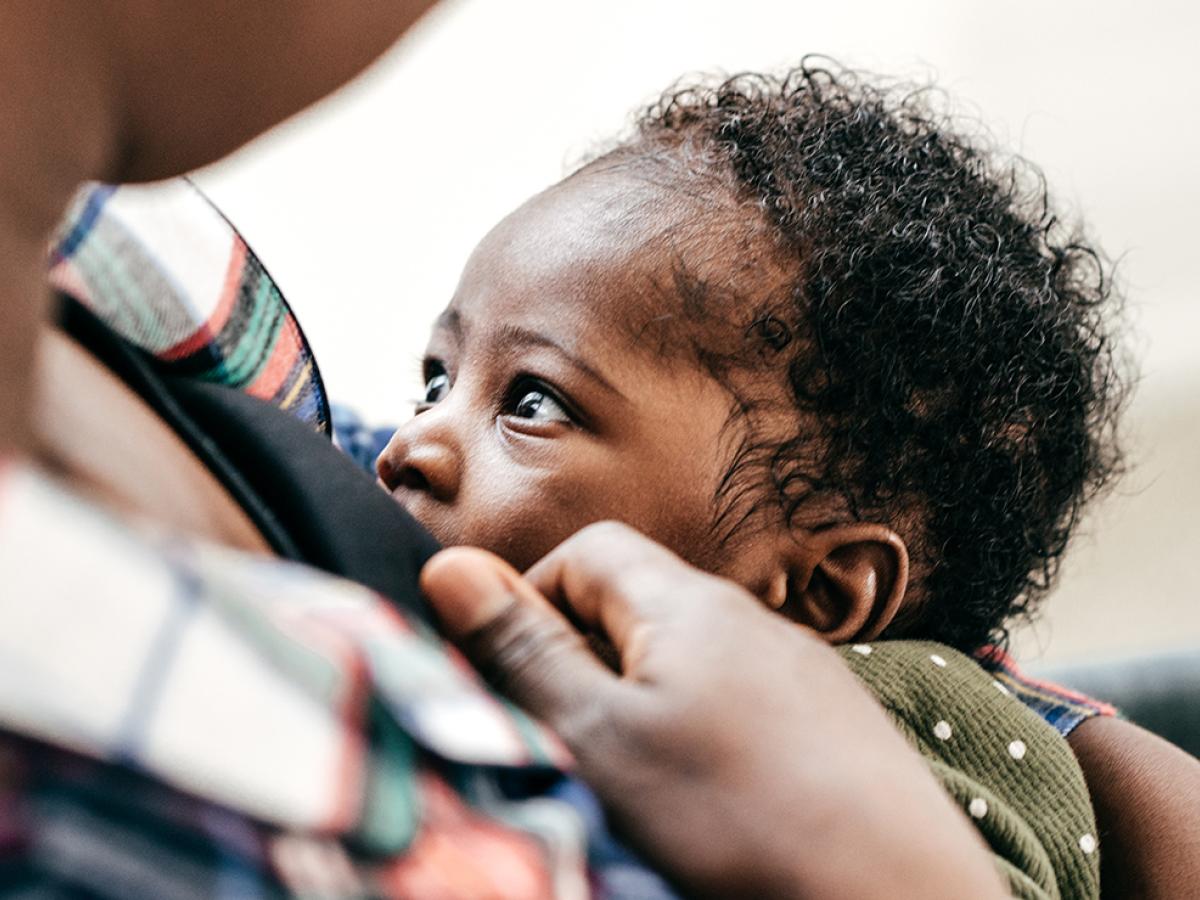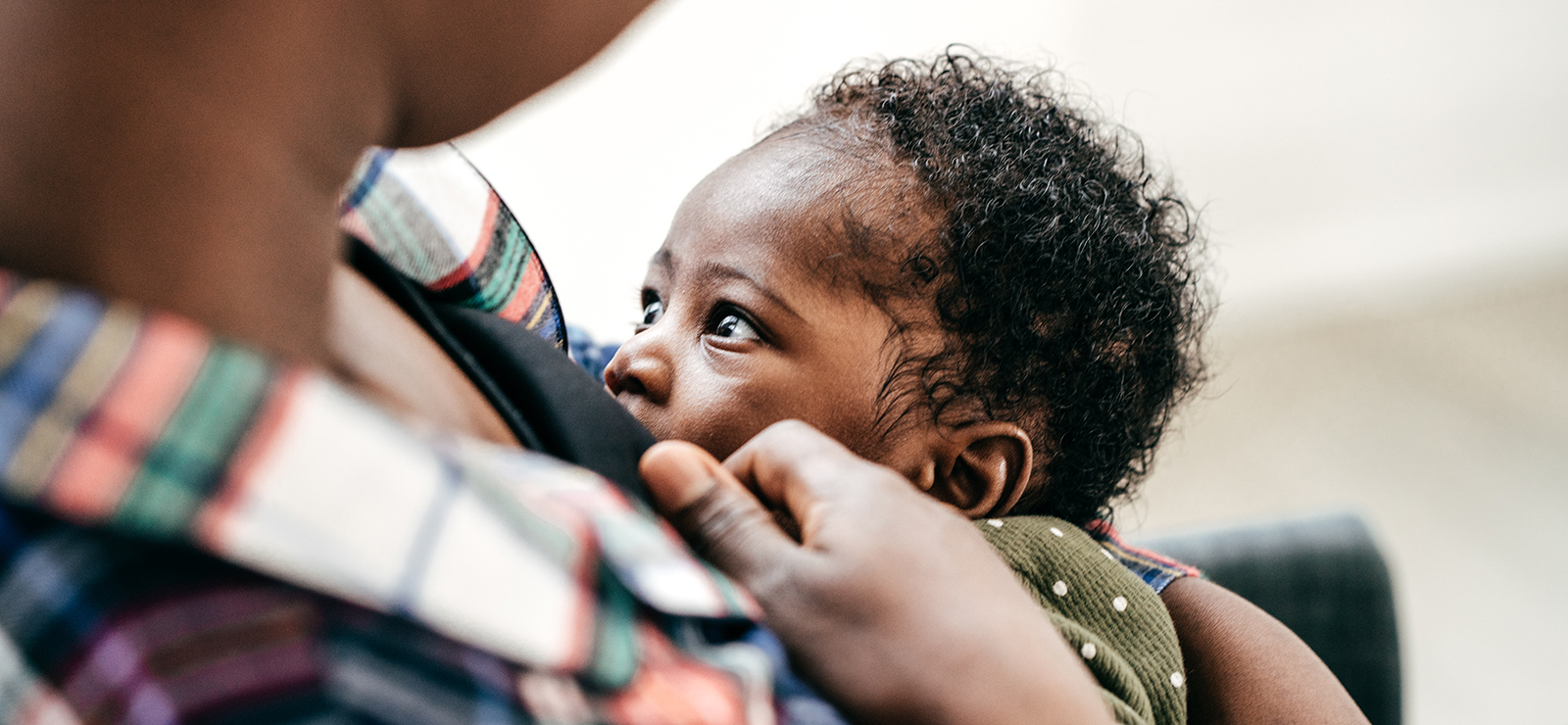August 29, 2022

Breastfeeding offers health benefits for all babies. And although some women are unable to breastfeed, or choose not to, the number of Black women who breastfeed is noticeably lower than in other racial groups. According to the American Civil Liberties Union, Black women initiate breastfeeding the least (70%), when compared to white women (86%) and women overall (83%). They also tend to breastfeed for a shorter amount of time.
Four years ago, Racquel Hykes, a certified lactation consultant, noticed the disparity and recognized that Black women may face unique challenges in breastfeeding. She decided to help by creating the Breastfeeding Sisterhood. The organization offers support for new mothers and works to improve the health of Black infants and families by providing evidence-based, culturally appropriate care.
We spoke to Hykes about the challenges facing Black mothers and how support services like the Breastfeeding Sisterhood are making a difference. Here’s what she had to say:
What do you think are some of the biggest breastfeeding challenges Black mothers face?
The challenges I see the most often have to do with misinformation. The fact that more Black women don’t breastfeed tends to make some Black women shy away from wanting to breastfeed. It can also push providers to unconsciously change how they word infant-feeding questions toward Black women. Instead of asking, “How can I help you with breastfeeding?” that question may be asked as, “Are you bottle feeding, or can I bring you some formula?” Just a small little tweak might open the possibility of breastfeeding — many Black moms just don’t necessarily know what their options are. We need to assume that moms want help with breastfeeding and let them tell us if they don’t.
There’s also a higher risk of postpartum depression in moms who are unsuccessful in breastfeeding. So it’s really important that we check in with moms frequently, especially Black moms, to make sure that whatever the specific goal is, whether that’s breastfeeding once a day or full time, she’s able to meet that goal. Or let’s help her reassess what is attainable for her. We know that Black women, in general, are not listened to as frequently. It’s not intentional, but sometimes we need to take a step back, look at the data and assess how well our Black moms are doing with breastfeeding compared to everybody else.
What led you to create the Breastfeeding Sisterhood?
Before I became a lactation consultant, I was a participant in the WIC (Special Supplemental Nutrition Program for Women, Infants, and Children) after I had my son. And they had an opening for a peer counselor — you needed to be supportive of women and have breastfed yourself. They offered me the job, and I thought, "What have I gotten myself into?”
My only job was to listen, let women know they weren’t alone in their journey and connect them with someone who was clinically trained to help them with lactation concerns. Along the journey, I noticed that most of my participants were white. I thought, “Do we just have a lower rate of Black women coming in? Or do Black women have an additional barrier to breastfeeding?” I also started to get curious about what happens on the other end of the support, the people who fix breastfeeding issues.
During my research, I found out that there aren’t many Black lactation consultants in Missouri and mid-Missouri. In fact, I’m the only one here in Jefferson City. I realized Black women may not have access to a provider who was culturally aware of what they needed.
That’s how the Breastfeeding Sisterhood journey started. I wanted to know more about how I could help everybody in general, but also how I could help Black women specifically, given that I was the only Black certified lactation consultant serving this area.
How does the Breastfeeding Sisterhood support new moms?
The thing I love most about the Breastfeeding Sisterhood is that it does whatever the mom needs, no matter what stage she’s in and whether she’s breastfeeding or not. We don’t turn anybody down.
The initial interview and intake application don’t focus just on breastfeeding. I want to know about your family structure, your education, your resources or your lack of resources. What are the biggest barriers in your life? Was your pregnancy planned or unplanned? I want to know the core of each woman and gain her trust.
Clinicians get a very limited amount of time to spend with patients when it comes to infant feeding. The primary goal of the Breastfeeding Sisterhood is for you to feel heard and get what you need for infant feeding. But we also try to meet the family’s mental health needs, financial needs and whatever else they need. If a mom just wants to discuss things, we’ll do that. If she wants something more intentional, such as a therapist, she’s immediately referred to the Heriford House counseling center in Columbia. They have specialty training in minority counseling.
Why are causes like the Breastfeeding Sisterhood so important?
Organizations like the Breastfeeding Sisterhood are extremely important. Black women are more likely to have negative birth outcomes like smaller babies, premature babies and preeclampsia with high blood pressure. They're four times more likely than white women to die in pregnancy. Breastfeeding lowers the rates of almost all those things.
In addition, families are most vulnerable right after birth or right before or during pregnancy. So if you make mothers feel heard and give them resources at those points, you not only prolong the baby’s life, but you give the whole family an advantage. They now have better mental wellness and more advocacy skills. They now have a supportive network of people they can build and lean on. And those moms can also educate and inform the next generation of families.
What do you see in the future for the Breastfeeding Sisterhood?
My goal for the Breastfeeding Sisterhood is to see it grow beyond a small grass roots organization. I’d like there to be a natural flow so when providers see a new Black mom, they automatically think to refer her to the Breastfeeding Sisterhood.
I’d love to see the Breastfeeding Sisterhood operate completely on grant money. That way I would have the resources and everything lined up so the only thing providers have to do is refer. And the only thing I’ll have to do is to give these women what they need.
Another goal we have is to help other Black women become board-certified as lactation consultants. But even if I can just teach women about breastfeeding so they can help their sister, friend or next-door neighbor, that’s good enough for me.
Next Steps and Useful Resources
- Have more questions for Racquel or her services? Find her on Facebook @thebreastfeedingsisterhood.
- Planning to breastfeed? Here are seven facts to guide your expectations.


